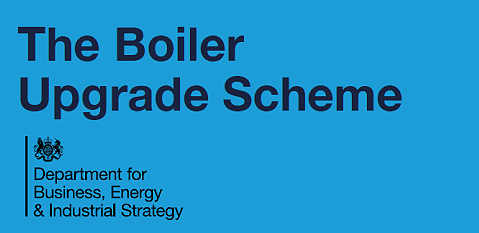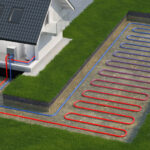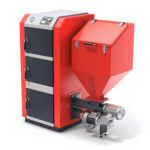
The Boiler Upgrade Scheme (BUS) is a government initiative for homeowners. It aims to help the homeowner afford the upfront cost of installing a heat pump. The policy can provide up to £5,000 for air-source heat pumps, and £6,000 for ground-source heat pumps.
The Government’s Boiler Upgrade Scheme has been a relative failure as far. A House of Lords Committee delivered a scathing review of the scheme, so it is surprising to see it extended until 2028. The total value of the scheme is £450m, with the hope that all new heating system installations will be low carbon by 2035.
How does the Boiler Upgrade Scheme work?
The scheme launched on the 1st of April and worked on a first-come-first-served basis for those who are eligible. The overarching initiative is the Heat and Building Strategy which replaced the ineffective Green Home Grant. The basis for the scheme is similar, however, wherein the government contributes fixed sums towards installing low-carbon energy measures. In this instance, for air and ground source heat pumps.
Funding and application
A basic ground source heat pump can cost between £2,000 to £15,000; as the funding is administered through grants, the homeowner will need to pay the difference. As the grants are either £5,000 or £6,000 depending on the heat pump installed, it is possible that the homeowner will need to fork out some extra cash for the installation.
The application process relies on the independent regulator Ofgem. They will actively negotiate and agree on a quote for the installation and apply for the grant on your behalf. Redeeming of the voucher will be led by the installer, which will confirm proof of the installation and process the completed paperwork. You will then need to confirm that the installer is acting on your behalf when Ofgem contacts you.
Eligibility for the Boiler Upgrade Scheme
The eligibility for the scheme is split into installer, property, and technology eligibility. Installers will require certification by the MCS. To ensure that we provide the correct criteria, the following text is taken directly from Ofgem:
Property eligibility
In order to be eligible for a BUS-funded installation, a property must:
- be in England and Wales
- comply with the insulation requirements of the scheme, or be exempt from these (when you apply, you will need to provide evidence of this exemption)
- (retrofits only) have an existing fossil-fuel or electric heating system that’s being replaced by the BUS-funded installation
Properties cannot be:
- social housing
- new builds (except where they are ‘self builds’ that have been built mainly using the labour or resources of the first owner and have never been owned by a business or organisation)
Eligible technologies
The following technologies are eligible for the BUS:
- air source heat pumps (not including air-to-air heat pumps)
- ground source heat pumps
- ground source heat pumps as part of a shared ground loop
- biomass boilers
Other eligibility criteria
Installers must ensure that the new heat pump or biomass boiler complies with requirements of the BUS regulations. These include that:
- the new heat pump or biomass boiler will be commissioned on or after 1 April 2022
- the new heat pump or biomass boiler meets the standards approved and published by the Secretary of State (to help you check, you can use the Boiler Upgrade Scheme product eligibility list, which is a subset of the MCS product eligibility list)
- the new heating system will be capable of meeting the full space and water heating needs of the property, and it is designed to do so
- the new heating system will only provide heating to the property being applied for (and any ‘related properties‘ that are included on the EPC)
- the new heat pump or biomass boiler will distribute heat using a liquid, for example through radiators or underfloor heating
- the new heating system will have a maximum capacity of 45kWth (for shared ground loops, the combined capacity of all heat pumps on the shared loop cannot exceed 45kWth)
- the new heat pump or biomass boiler will not have been used prior to commissioning, except in limited circumstances, eg to dry out plasterwork during construction or renovation (for shared ground loops, a new heat pump can connect to an existing shared loop)
- the new heating system will not be a hybrid system that combines a heat pump with fossil fuel heating
- all heat-generating components of the original heating system will be replaced (where applicable, you may retain circulation pumps, solar thermal collectors, wood-burning stoves, and supplementary electric heaters, including immersion heaters)
- the new heating system will replace either a fossil fuel heating system or an electric heating system
- the new heating system will not replace a system that already contains a heat pump or biomass boiler
- the property owner has not received another grant from public funds to cover any of the purchase or installation costs
- the new heating system has not have been funded by the Energy Company Obligation (ECO)
- the property owner at the installation address will own the new heating system after it is installed
An additional requirement for heat pumps only is that they:
- have a minimum seasonal coefficient of performance (SCOP) rating of 2.8
In addition, biomass boilers:
- can only be installed in rural properties
- can only be installed in properties that are not, and have never been, connected to the gas grid
- cannot be installed in self-builds
- must have an emissions certificate to show they meet certain emissions standards for the scheme
Cost of heat pumps and biomass boilers
The cost of air-source heat pumps, ground-source heat pumps, and biomass boilers can vary depending on several factors, such as the size of the system, the type and quality of components used, the complexity of the installation, and the location of the property.
As a rough guide, here are some average costs based on industry estimates and data:
-
Air source heat pumps: The installed cost of an air source heat pump system typically ranges from £6,000 to £12,000 for a small to medium-sized property. This cost can vary depending on the size of the property, the quality of the system, and the difficulty of the installation.
-
Ground source heat pumps: The installed cost of a ground source heat pump system is usually higher than an air source system, typically ranging from £10,000 to £18,000 for a small to medium-sized property. However, ground-source heat pumps can be more efficient than air-source heat pumps, meaning they can provide greater savings on energy bills over time.
-
Biomass boilers: The installed cost of a biomass boiler system can vary widely depending on the size and type of system, the quality of components used, and the complexity of the installation. As a rough guide, the installed cost for a domestic biomass boiler can range from £10,000 to £20,000 or more.
- Air source heat pump
- Ground source heat pump
- Biomass boiler















Hi – I’m considering replacing my domestic combi gas boiler with an air source heat pump, which is approx 3 x seasonal CoP. My energy supplier’s price for KWh electricity is 4x more than KWh gas. Due to this, I will pay more for the same heating energy if I switch. Have I got this right?